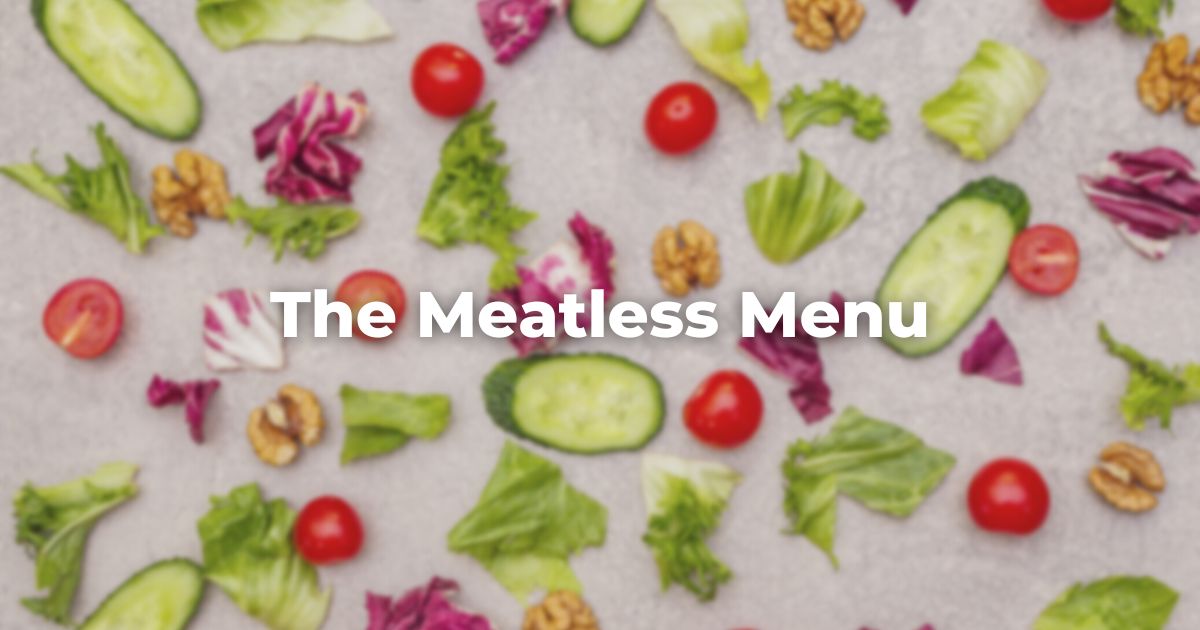Eating in Vegan or Vegetarian Restaurants
The Conservative Movement has recently ruled that it is acceptable to eat at a vegan or vegetarian restaurant, even one that does not have hashgachah, kashrut supervision.
(Read the full ruling here.)
Which raised some eyebrows. Don’t we always insist on hashgachah? How can we be sure of the kashrut of a product absent of hashgachah?
The first thing to note is that most kashrut issues have to do with meat—its proper slaughter and preparation and its mixture with dairy. In a vegetarian setting, those issues should all be off the table.
The two most significant non-meat-related kashrut issues, relating to cheese and wine, are also no longer relevant according to rulings of the Conservative Movement. Kashrut problems relating to Israel-specific agricultural laws are unlikely to be present.
So the main issue becomes one of supervision.
What Does Supervision Look Like in This Case?
The concept of kashrut supervision is a simple one. Since the rules of kosher ingredients and kosher utensils are complicated, one can be certain that all is in order only when there is a knowledgeable professional overseeing the process. We have, in fact, created a robust kashrut supervision industry based upon that perception.
But actually, we do not always insist on hashgachah.
There is no mashgiach—no kashrut supervisor—in my kitchen as I prepare Shabbat for my family. Nor is there a mashgiach at my friend’s home where I will be a guest on another occasion. It is reasonable, in the eyes of Jewish law, to expect a person dedicated to eating kosher to prepare food that is kosher. We accept their say so.
This is the formal precept of ne’emanut, or trustworthiness. We are permitted and expected to rely on trusted others.
But restaurateurs, especially those not themselves committed to kashrut, are not considered to have proper ne’amanut.
(See more: Kosher Eating)
Enter hashgachah.
What then is the status of a vegan or vegetarian restaurant? One can certainly not assume the proprietors keep kosher.
But there are other forms of ne’emanut to consider. A restaurant that holds itself out as vegan or vegetarian has a commercial interest, as well as most likely a moral one, in not having any meat products in its kitchen. Government laws against misrepresentation and the restaurateur’s incentive to maintain a positive commercial reputation, in addition to the restaurateur’s own commitments, make it likely that the bulk of kashrut issues are moot.
Professionals, e.g. doctors and pharmacists, are also often treated as especially trustworthy because they have a professional reputation to maintain. The restaurateur is not precisely that, but is the interest he has in his reputation equally compelling? How trustworthy should we consider a vegan restaurant?
And understanding that most kashrut issues are likely not at play, is that enough to make do without supervision?
Understanding Cases Without Supervision
Consider this case that appears in the Talmud:
A shipment of beer arrived at the port of Akko. Rabbi Abba of Akko set a watch over it. Rava said to him: Until now who was watching it? Abba answered: Until now, what concern did we have? If our concern was that they might mix in some wine – a pint of beer goes for a dollar, whereas a pint of wine goes for four dollars!
AvodahOriginally understood as Temple service, but expanded to mean any service to God.
Related to: gemilut hasadim. See Pirkei Avot 1:2 Read more Zarah 34b
Wine, argues the TalmudReferring to one of two collections, the Jerusalem and Babylonian Talmuds, edited in the 6th century, that contains hundreds of years of commentary, discussion, and exploration of the ideas in the Mishnah. One could describe it as Mishnah + Gemara = Talmud Read more, was too valuable to put into beer, so we don’t need supervision to rely on the reasonable inference that they have not mixed any in the beer.
But here in Akko we do need supervision lest there might be unkosher wine mixed in, explains Rashi, because here beer is expensive and wine is cheap and there is reason for concern that an unscrupulous merchant might adulterate the beer.
There is no question that having supervision is going to assure that there is little chance that the food we are served is not kosher.
But even with supervision there is never no chance. I was a guest, many years ago, at the home of a very observant friend’s family one Shabbat morning when we received a message from the kosher butcher that a treifah, a kosher disqualification, was discovered in the meat we had eaten the prior night, and we should not use it, but return everything to the butcher for a complete refund.
Farfallen (Yiddish for “what’s done is done”). My friend’s mother had multiple questions for her rabbi about what to do with the utensils we had used. But as to having eaten unkosher food—well, there is Yom Kippur.
So the question, in the end, is when are we satisfied that the likelihood of any risk of unkosher food is sufficiently remote that we may comfortably eat.
So, Can You Eat in Non-Kosher Meatless Restaurant?
The teshuvah, the ruling, concludes that the concern about the introduction of unkosher food at a recognized vegan or vegetarian restaurant is sufficiently small to qualify. That, in turn, relies on a halakhic principle known as s’feik s’feika, which I have translated as “double doubt.”
Doubts and Risks
The first doubt is whether there may be unkosher meat in this vegan or vegetarian establishment. As we have argued, this is unlikely.
Now, if the risk was altogether remote, we might want to argue, like the GemaraThe discussion portions of the Talmud based on the quoted Mishnah. Read more in Avodah Zarah, that no supervision is needed. But the risk of some additive derived from meat slipping by the restaurateur in some commercial mix being used seems not that remote.
So under normal circumstances, with only that single doubt, we would require a supervisor in order to eliminate that possibility. Add to the first doubt, however, a second one, which applies to the matter of the possible additive and by which your order might still be kosher, of which there are many possibilities—
- a doubt whether the potentially unkosher additive is less than one part in sixty in the food prepared for you, in which case it may be disregarded after the fact (a principle known as bittul b’shishim), or
- a doubt whether it underwent chemical processing that had changed its nature, so it is no longer considered meat (a principle known as davar chadash), or
- a doubt whether it might not be in your order at all—this then presents kashrut concerns only because of use in the same utensils, but those utensils might not have been in use in the past 24 hours, in which case they can no longer communicate their unkosher nature to the food cooked therein (a principle known as ben yomo), or
- a doubt whether the utensils had been cleaned with an agent that would mar the taste (a detergent—a principle known as notein ta’am lifgam) before their use in preparing your food
—then the double doubt can serve as a reason to consider the risk of unkosher food sufficiently remote to permit eating that food. To read more on the principle of double doubt, see my companion article.
(See more: Halakha and the Assessment of Risk, Rabbi Avram Reisner)
It is on this basis that the ruling that it is permissible to eat in vegan and vegetarian restaurants without a hekhsher stands.
Exceptions
A few caveats attend the teshuvah.
It would be technically possible to make careful arrangements to pay in advance, or after the fact, at an otherwise kosher restaurant, open on Shabbat, and be served food that has been precooked and then warmed. This is just as it is at any home. Arrangements like this are quite common in Jerusalem. Despite this, the teshuvah advises against eating in a vegan or vegetarian restaurant doing business on Shabbat because of the likelihood of cooking or other Shabbat infractions done pursuant to your order.
Likewise, the teshuvah suggests not eating at a Jewish-owned restaurant that does business on Shabbat, even on Saturday night, lest some of the foods served be precooked under the aegis of a Jew on Shabbat.
Third caveat: In light of the prohibition of a Jew owning chametz during Pesach, the teshuvah recommends not eating in Jewish-owned vegan or vegetarian restaurants for two weeks after Pesach (until after Yom haAtzmaut), and continuing to refrain from ordering liquor there until after Shavuot.
See Rabbi Reisner’s full teshuvah here, written for the Committee on Jewish Law and Standard in May 2023.
Author
-

Rabbi Avram Israel Reisner is rabbi emeritus at Chevrei Tzedek Congregation in Baltimore, MD. He is a long-standing member of the Conservative Movement's Committee on Jewish Law and Standards. He earned a PhD in Talmud at JTSA and an MA in Bioethics at the University of Pennsylvania and serves as an appointee on the Maryland Stem Cell Research Commission. He is the author, most recently, of a teshuvah on eating at vegetarian restaurants and co-author of one on the mitzvah of sustainability. He has authored other significant teshuvot on End-of-Life Treatment, Genetically Modified Food and Forming a Minyan Over the Internet, and is a co-author of the landmark teshuvah permitting same-sex marriage.
View all posts






